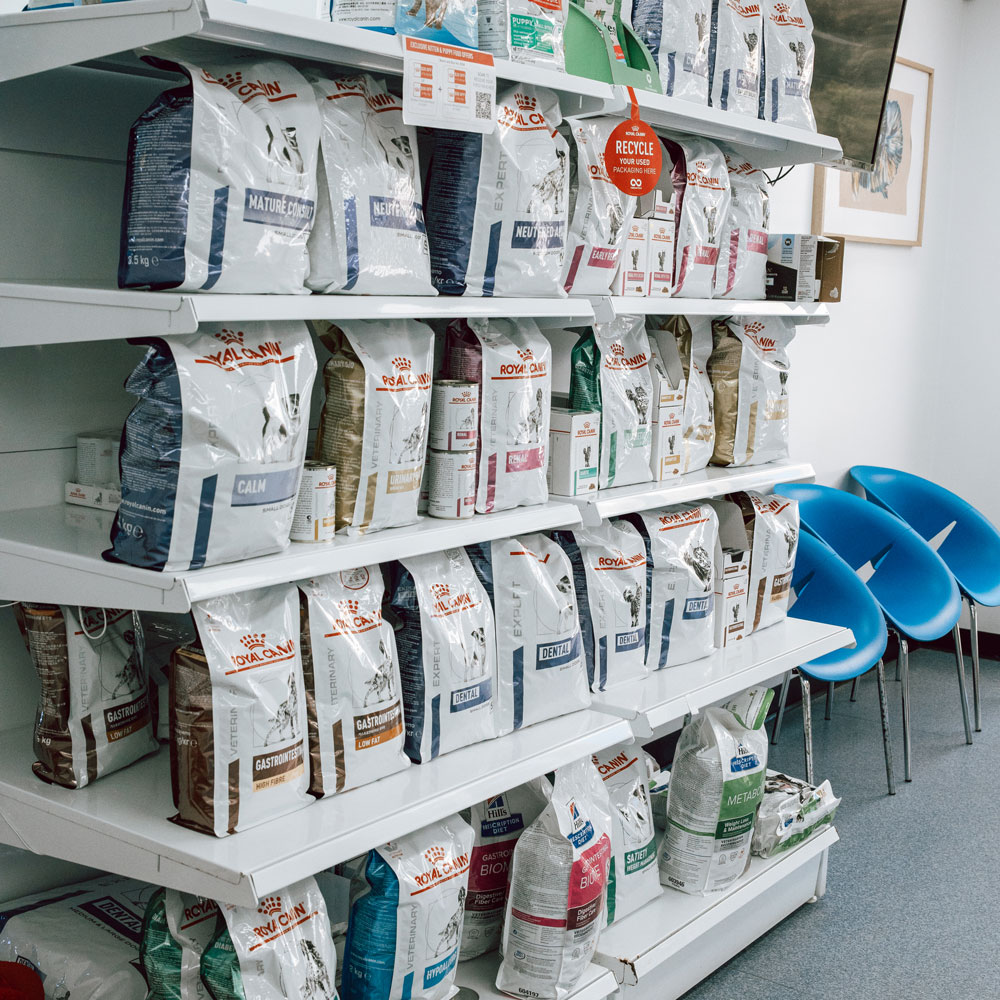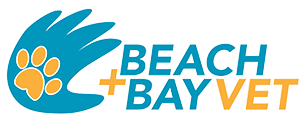Pet Nutrition
at Beach + Bay Vet
Pet Nutrition
A high quality diet is so important for maintaining your pet’s general health throughout all stages of their life. Please ask one of our lovely vets or nurses for professional advice on the best pet nutrition for your individual pet’s requirements.
What food can I buy at Beach and Bay Vet?
In the clinic, we sell the Hills brand of food, which provides easy, well-researched and balanced nutrition options for growing pups/kittens, pregnant and lactating females, adult dogs and cats, and dear old senior pets.

Hills also offers a wide array of balanced diets formulated for specific health issues, including:
- for weight loss or maintenance of normal weight
- for management of chronic kidney disease
- for management of acute or chronic liver disease
- for support of brain function and health, particularly in conditions such as cognitive decline, i.e. “pet dementia”
- hypoallergenic diets for pets with food allergies
- for pets with sensitive stomachs, or those recovering from a gut illness
- for pets with poor appetite, or those recovering from severe illness
- for maintaining dental health, particularly after a dental clean
These diets generally come in wet and dry forms, so are versatile for different requirements.
Should I feed my pet a wet or dry food diet, or both?
As long as the diet itself is nutritionally balanced, this mostly comes down to individual pet and owner preference. However, you may consider one or the other if your pet has specific requirements.
Benefits of a dry food diet can include:
- easier maintenance of dental cleanliness
- makes mealtimes easier for an owner in terms of food preparation and storage
- can make stools more “formed” in some animals (easier to pick up!)
- less food spoilage if you have a pet who likes to “graze” on food throughout the day
- can be put into “puzzle feeder” toys such as Snuffle mats, Kong Wobblers, cat activity feeding boards, etc., for great mental activity for your pet
Benefits of a wet food diet can include:
- easier to hide liquid and tablet medications in
- may be more comfortable for old pets with few remaining teeth
- can be more gentle on pets with “sensitive stomachs”
- preferable for cats with previously diagnosed lower urinary tract disease/cystitis
- supplements water intake in pets who have higher water requirements, e.g. cats with chronic kidney disease
Is a raw/home-cooked diet better?
A well-planned, fresh raw or home-cooked diet can give your pet great interest and enjoyment at mealtimes, and some pets may prefer this to a commercial dry or wet food diet, or even require it due to extreme food-pickiness combined with specific medical needs. However, before you embark on a raw or home-cooked food diet, it is important to consider the following:
- Have you properly researched a balanced dietary plan that meets your pet’s long-term nutritional requirements?
It is important to understand that simply feeding raw/cooked meat +/- bones does not provide a balanced diet for your dog or cat, and will likely miss out important nutrients your pet requires for long-term health.
If you are seriously considering a home-cooked or raw diet for your pet, we would strongly advise contacting us to ask about the Massey University Nutrition Consultancy Service. This specialist veterinary online service can provide home-cooked recipe formulations or evaluate your existing pet recipe, to make sure your pet is receiving balanced nutrition.
An alternative option is to use the BalanceIT online service for custom homecooked recipes, which is managed by board-certified veterinary nutritionists. Both services will cater to pets with specific medical dietary requirements.
- Do you have a reliable source of ultra-fresh (human-grade) meat? Have you thought about safe storage and preparation of regular meals for your pet?
One of the perceived benefits of a raw food diet is that it is viewed as more “natural”. However, it is not natural for food to have gone through a large abattoir/”meat-works” processing system where there is higher risk of it being tainted with dangerous bacterial contaminants, such as campylobacter and salmonella. Infection with these bacteria can cause severe gastroenteritis (vomiting, diarrhoea and unwellness) in your pet.
More worryingly, recent veterinary studies have shown that feeding raw chicken (which is a particularly high-risk meat for campylobacter) is associated with a 70x higher risk of your dog contracting Acute Polyradiculoneuritis (APN). APN is a form of paralysis that affects the limbs and sometimes the breathing muscles of a dog, requiring heavy nursing and ongoing veterinary care. It can last several weeks to several months, and has no specific treatment.
Lastly, salmonella and campylobacter bacteria are “zoonotic”, meaning they can pass from pets to people. This can cause significant illness in healthy humans, and can be fatal in those with low immune systems.
You can reduce the risk of your pet and yourself picking up bacterial contaminants from raw food by only providing your pet with the freshest human-grade raw meat, which has been properly stored and safely defrosted. Cooking meat to safe human standards also will significantly reduce risk of food poisoning from food contaminants. And as always, practice good hand-washing hygiene after handling your pet, especially if they are on a raw diet or if you have a compromised immune system.
- Do you wish to feed your pet bones?
Raw bones can be a good source of mental stimulation for your cat or dog, and are one option for helping to keep their teeth clean. Never feed your pet cooked bones, as these are more likely to splinter into sharp pieces which can injure your pet’s mouth or stomach.
Bear in mind however, that even raw bones can disagree with some pets, causing gut upset signs such as vomiting or constipation, or breaking your pet’s teeth during chewing.
For this reason, we prefer other dental health and mental stimulation options, such as treat-filled Kongs, commercial dental diets (e.g. Hills t/d), chew treats which bend a little (e.g. pigs ears/noses), or dental treats such as Oravet chews. Any treat should be fed under supervision to ensure your pet chews it properly before trying to swallow it (which can be a problem in breeds such as Labradors!).
Does my dog need a grain-free diet?
Grain-free diets have experienced a massive rise in production and marketing in recent years, similar to the human “Paleo” movement.
Whilst we understand the wish of some owners to feed their dog the most natural, quality diet, we do not currently advocate grain-free diets. This is largely due to the ongoing investigation into grain-free diets by the Food and Drug Administration (FDA) in the USA, due to the potential link between long-term feeding of grain-free diets and an increased risk of pets developing a heart condition called Dilated Cardiomyopathy (DCM), even if they are a non-predisposed breed. The grain-free diets of most concern appear to be diets high in legumes such as peas, chickpeas or lentils, or high in potatoes/sweet potatoes, which are used in place of grains. DCM causes increasing weakness and abnormality of the heart muscle, and often leads to heart failure.
If you are interested in feeding your pet a more natural, unprocessed diet, consider either utilising the services listed above for balanced home-cooked diets, or else look for a good quality, natural-based commercial diet which states that it is nutritionally balanced, but not grain-free.
My pet is overweight. What should I do?
Overweight pets are at much higher risk of certain health problems, such as painful joints, difficulties breathing during exercise, poor sleep, liver problems, diabetes, and overheating.
If you think your pet might be overweight, we would recommend the best option is to book your pet in for a wellness check with one of our vets. During this consultation, the vet can:
- examine your pet to determine if they are overweight, and what their target weight should be
- ensure there is not a medical reason for your pet’s weight gain – this may require blood tests in some cases
- give you guidelines for a safe rate of weight loss in your pet
- discuss options for commercial diets which will give clear guidelines as to correct amounts to feed your pet for weight loss and then maintenance of correct weight
Once your pet has started on their weight loss journey, feel free to bring them in at any time during our regular hours to do a “Weigh In” on our scales. If they are not losing weight, we can make some further suggestions to help. If they are losing weight, you and your pet can enjoy some impromptu Beach and Bay Vet cheer squad support (with congratulatory cuddles for your pet!).
Please contact the team at Beach and Bay Vet if you would like any further assistance regarding pet nutrition.
Contact Us Today!
OPENING HOURS
8:30am – 6pm Monday-Friday
8:30am – 1pm Saturday
MAKE A BOOKING
CALL US
SEND US A MESSAGE

Beach and Bay Vet is an inclusive and welcoming space for everyone.
We acknowledge the traditional owners of the land on which we live and pay our respects to elders past and present.
We welcome pets from Empire Bay and the surrounding area, including Bensville, Blackwall, Booker Bay, Ettalong, Kilcare, Kilcare Heights, Point Clare, Umina, and Woy Woy.
